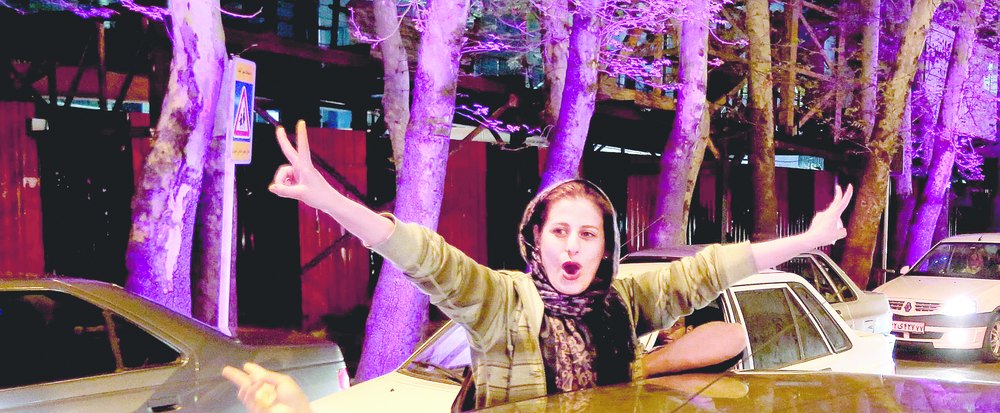
April 3: The multilateral agreement in Lausanne last night to defang Iran's nuclear programme has turned on its head the Greek mythological tale of Daedalus killing two birds with one stone so that he and his son Icarus could fly out of imprisonment on wings made from the birds' feathers.
Iran and the US, along with the other four permanent members of the UN Security Council plus Germany (collectively known as P5+1), agreed last night to kill one bird with two stones.
The bird they effectively consigned to the death row is Iran's nuclear programme in its present form, widely believed to be the precursor of an atomic weapon for the Islamic Republic.
The two neo-proverbial stones that will bring down the bird whose shadow had darkened the global diplomatic horizon for more than two decades are the arguments that will be used in the coming weeks, months and in the next presidential elections in the US and in Iran as the rationale for what was agreed in Lausanne, crowning 12 years of talks with success.
In a conference call with invited reporters to explain the background to the conclusion of the marathon negotiations, the White House acknowledged the differing objectives of rival parties which brought about an agreement.
Iranian "foreign minister (Javad) Zarif will represent that this is a deal that will enable Iran the ability to access peaceful nuclear energy and he will describe that," said a senior Obama administration official. The ground rules for the conference call prohibit the briefers from being identified by name.
"We will describe why this is a deal that in that context cuts off Iran's pathways to a nuclear weapon and has the type of transparency and inspections that can allow us to verify that Iran cannot pursue a nuclear weapon. So we are obviously approaching this challenge with different national objectives, but it's the same deal that will accomplish those objectives," the official added.
Earlier, the European Union's foreign policy chief, Federica Mogherini, along with Zarif, announced details of the agreement at a media conference in Lausanne.
"As Iran pursues a peaceful nuclear programme, Iran's enrichment capacity, enrichment level and stockpile will be limited for specific durations and there will be no other enrichment facility than Natanz" nuclear facility in Isfahan province, Mogherini read from a joint statement. She had attended the talks in Lausanne for the last eight days.
Among key provisions under the deal, Fordow, near the holy city of Qom, the site of an underground uranium facility, "will be converted from an enrichment site into a nuclear physics and technology centre. There will not be any fissile material at Fordow," she announced. "Iran will take part in international cooperation in the field of civilian nuclear energy which can include supply of power and research reactors."
The EU and the US will terminate sanctions "simultaneously with the International Atomic Energy Agency-verified implementation by Iran of its key nuclear commitments" and a new UN Security Council resolution will "terminate all previous nuclear-related resolutions", the joint statement said.
A detailed plan of action will be in place by June 30 and ready for implementation.
If all goes well - and it is a big if - this year's Nobel Peace Prize was probably decided in Lausanne last night. With the Iran breakthrough, John Kerry has earned his reputation as the most outstanding US secretary of state since Henry Kissinger, who was awarded the 1973 Nobel Peace Prize along with his Vietnamese counterpart, Le Duc Tho, for armistice in the Vietnam War.
In the span of less than a year, Kerry successfully pursued Barack Obama's historic rapprochement with Cuba, ending over half a century of hostility, stabilised Afghanistan and now brokered the deal with Iran. Zarif, who will logically share the prize, if it comes about, has been no less outstanding in his contribution to the protracted negotiations that produced a nuclear settlement.
After approving the agreement in Lausanne, President Obama quickly went about dealing with the fallout of an anticipated Washington-Tehran thaw on America's traditional alliances in the Gulf.
He spoke to Salman bin Abdulaziz al Saud, the new king of Saudi Arabia. Riyadh's new diplomatic initiative, known as the "Salman Doctrine", has posed a challenge to Obama.
In the expectation the "Great Satan", as the US was called in Tehran, and the "Axis
After that, Obama tackled those considering pursuit of the Salman Doctrine and made them an offer they cannot refuse.
The President “extended an invitation to the leaders of the GCC to come to Camp David this spring in what will be a very important summit meeting”, the senior Obama official revealed. Most of the GCC heads of state have not been to Camp David and none of them will even consider refusing Obama’s invitation.
During eight days of talks in Lausanne, the negotiators slept just about two hours each night as the course of a deal see-sawed from hope to despair and back to hope. On the penultimate day of the negotiations, meetings started at 9pm and went on till 6am the next day. Obama was hands on and spoke to Kerry in Lausanne or to US national security adviser Susan Rice past midnight Washington time.
The best description of the complex diplomatic engagement was given during the conference call by one senior US official who compared the effort to working on a Rubik’s Cube.
“There are six countries plus the EU and Iran. So it is incredibly complex... to ensure that all those pathways to nuclear fissile material is shut down, there are many pieces... talk about a Rubik’s Cube or a jigsaw puzzle. You have all of the pieces in front of you. You have got to find a way for them to fit together and just click in the right way. Otherwise, you lose your objectives. And so you look at all of those elements it becomes an incredibly complex negotiation.”











